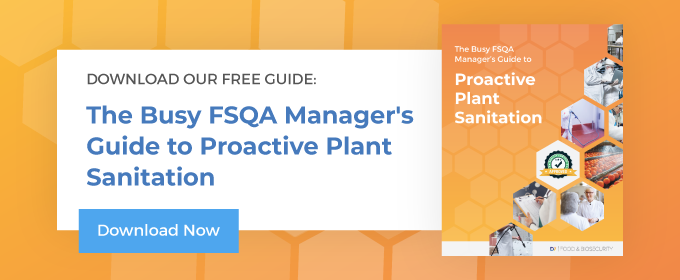 Production uptime is a high priority in any food processing plant, and many lines run 16-20 hours a day to meet production goals. Downtime can be caused by many factors, including equipment failure, worker shortages, or the presence of unwanted pathogens. Balancing production and plant sanitation is a difficult task for any food safety and quality assurance (FSQA) manager. Although it might feel time-consuming, a proactive approach to cleaning with a regular schedule can minimize production downtime in the long run.
Production uptime is a high priority in any food processing plant, and many lines run 16-20 hours a day to meet production goals. Downtime can be caused by many factors, including equipment failure, worker shortages, or the presence of unwanted pathogens. Balancing production and plant sanitation is a difficult task for any food safety and quality assurance (FSQA) manager. Although it might feel time-consuming, a proactive approach to cleaning with a regular schedule can minimize production downtime in the long run.
The Risks of Not Having a Regular Plant Sanitation Schedule
Stubborn Biofilms
Without a regular cleaning and sanitizing schedule that reduces bacteria to safe levels, you are just waiting for bacteria to grow. When left unaddressed, some bacteria can develop into biofilm. Biofilm is a hardy colony of bacteria and other microorganisms protected by an extracellular matrix that is resistant to many disinfectant products. Removing biofilm can be costly and time-consuming, especially if mechanical scrubbing is required on every surface.
Staggering Costs
Shutting down a production line for unscheduled cleaning and disinfection can have a domino effect that includes:
-
- Missed deadlines
- Impacts on the production of other products
- Lost revenue
Depending on the organization, unplanned downtime can cost approximately $30,000-$50,000 per hour. Planned cleaning has costs, but when compared to the potential costs of unplanned downtime, it’s a worthwhile investment.
Stressed Employees
Unplanned downtime is never good for morale. Even when employees are paid for that time, it can be frustrating to wait for sanitation crews to complete their work with no other tasks to perform. When those employees are then expected to catch up on production from the lost time, it results in stress and costly overtime.
Disappointed Customers
Production delays could cause you to miss deadlines and delay customer orders. Although customers can be understanding, late orders are blemishes on your reputation. If it happens too often, you could be putting your business in jeopardy. A proactive approach to plant sanitation can help you avoid unplanned shutdowns due to high levels of bacteria and other pathogens.
How a Regular Cleaning Schedule Helps Reduce Lost Time
Production time is lost when the line needs to be shut down for cleaning, but when that time is predictable, you can plan your schedule around it. However, responding to an outbreak with a deep clean takes much more time, potentially having a much more significant impact. With regular cleaning, you can reduce the risk of a costly and disruptive shutdown.
Prevent Outbreaks and Biofilm Formation
Daily plant sanitation between shifts is essential, but it’s not enough to prevent the formation of biofilms or the growth of hidden bacteria. In addition to daily cleaning, schedule deep cleans to address invisible and hard-to-reach areas, including:
-
- Drains
- Walls and ceilings
- Behind equipment
- Inside equipment
- Surface cracks, chips, and crevices
Reduce Costs
Planned downtime might have a temporary effect on production, but if you can avoid the costs of unplanned downtime and the subsequent domino effect, it is less expensive in the long run. Build planned downtime for deep cleaning into your annual budget to avoid surprises.
Optimize Downtime
When you have scheduled downtime for cleaning, use that time for other activities such as equipment maintenance or employee training. Employees won’t be frustrated by not having anything to do, and there will also be less stress around downtimes because employees will know when to expect them.
Keep Customers Happy
By building sanitation events into your production schedule, you can create realistic deadlines and meet them. When you set expectations about order times and communicate that scheduled sanitation is included in that estimate, it builds confidence that you maintain a sanitary environment.
How Decon7 Systems Helps
Decon7 Systems offers consultations and a range of sanitizing and disinfection products to keep your facility clean during production and downtime. We work closely with your team to develop a strategy that makes the most sense for your schedule and your facility’s specific needs.
D7, our flagship product, is a unique formulation that can be applied as a foam, spray, fog, mop, or soak. The product cleans and disinfects in a single application and has short contact times to keep your crew moving. In addition to D7 and other sanitizers, we provide all the equipment you need for efficient and effective application.
Read The Busy FSQA Manager’s Guide to Proactive Plant Sanitation to learn more.


